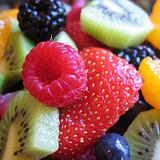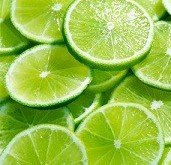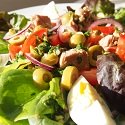Lime Nutrition Facts,
Health Benefits of Limes
All about lime nutrition information, lime juice nutrition, lime nutrients, nutritional benefits of lime and lime juice
There are many varieties of limes; the majority of us are familiar with the bitter tasting variety. Sweet limes exist but in most countries appear to be difficult to obtain.
Limes are very low in calories, but let’s face it, we’re unlikely to eat one. We just want to give one a squeeze to release some juice for cooking, or maybe as part of a cocktail or salad dressing, or we simply want the zest. Limes are almost fat free and contain no cholesterol.
They are packed with vitamin C, with one serving providing 49% of our recommended daily intake (RDI). However, it’s worth bearing in mind that lemons contain more than double the levels of vitamin C than a lime. Limes are full of other vitamins and minerals but only in modest quantities. Limes also contain citric acid. They are thought to provide relief from arthritic pain and the juice acts as a cooling agent.
If you’re after the zest of a lime, try purchasing organic limes that won’t have had the wax coating applied. The zest will provide all the flavour of the lime, without the acidic taste. Limes should store for at least a week. Before juicing a lime, it’s often recommended to roll it on a surface so it releases more juice.
Compare lime nutrition facts to the other fruits.
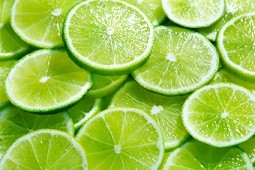
Nutritional Value of Limes
| Lime nutritional value per 100 g (3.5 oz) Refuse: 16% (Peel and seeds) Scientific Name: Citrus latifolia |
||
|---|---|---|
| Proximates: | ||
| Nutrients | Limes, raw | Lime juice, raw |
| Water | 88.26 g | 90.79 g |
| Energy | 126 kJ (30 kcal) | 104 kJ (25 kcal) |
| Protein | 0.70 g | 0.42 g |
| Carbohydrates | 10.54 g | 8.42 g |
| Total Fat: | 0.20 g | 0.07 g |
| Fiber | 2.8 g | 0.4 g |
| Cholesterol | 0 mg | 0 mg |
| Minerals: | ||
| Calcium, Ca | 33 mg (3 %) | 14 mg (1%) |
| Iron, Fe | 0.60 mg (3 %) | 0.09 mg (1%) |
| Magnesium, Mg | 6 mg (2 %) | 8 mg (2%) |
| Phosphorus, P | 18 mg (2 %) | 14 mg (1%) |
| Potassium, K | 102 mg (2 %) | 117 mg (3%) |
| Sodium, Na | 2 mg (0.1 %) | 2 mg (0%) |
| Zinc, Zn | 0.11 mg (1 %) | 0.08 mg (1%) |
| Copper, Cu | 0.065 mg (3 %) | 0.027 mg (1%) |
| Manganese, Mn | 0.008 mg (0.4 %) | 0.018 mg (1%) |
| Selenium, Se | 0.4 mcg (0.6 %) | 0.1 mcg (0%) |
| Vitamins: | ||
| Vitamin C | 29.1 mg (49 %) | 30 mg (50%) |
| Thiamine (Vit. B1) | 0.030 mg (2 %) | 0.025 mg (2%) |
| Riboflavin (Vit. B2) | 0.020 mg (1.2 %) | 0.015 mg (1%) |
| Niacin (Vit. B3) | 0.200 mg (1 %) | 0.142 mg (1%) |
| Pantothenic acid (B5) | 0.217 mg (2 %) | 0.123 mg (1%) |
| Vitamin B6 | 0.043 mg (2 %) | 0.038 mg (2%) |
| Folate (Vit. B9) | 8 mcg (2 %) | 10 mcg (3%) |
| Vitamin A | 50 IU (1 %) | 50 IU (1%) |
| Vitamin E | 0.22 mg (1 %) | 0.22 mg (1%) |
| Vitamin K | 0.6 mcg (1 %) | 0.6 mcg (1%) |
| Percentages are relative to US Recommended Daily Intake (RDI) for adults. | ||
Author: Lana Soko
You Might Also Like:
Like This Page?
|
Share This Page:
|
Search Our Site:

Free E-Book:
We Recommend:
Looking to get your body into great shape? Get the very best results for your efforts and money! Save your valuable time from surfing the internet. These are theBestselling Weight Loss Programs
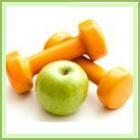
Programs that work and have thousands of satisfied customers worldwide!

 |

